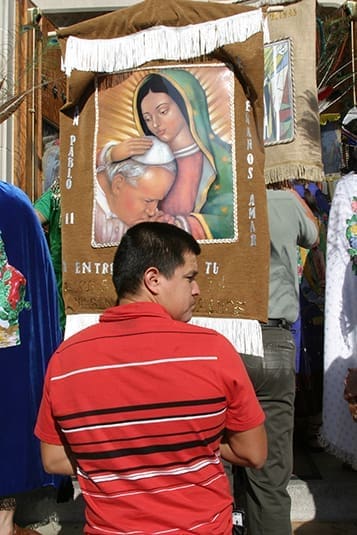Atlanta
Local TV Network Features Hispanic Ministry
By RUTH E. DÁVILA, Special To The Bulletin | Published January 20, 2011
Saturdays this month at 9 p.m., the Archdiocese of Atlanta shares the history of its Hispanic Ministry on Atlanta Interfaith Broadcasters, a local television network promoting dialogues among diverse faiths and cultures. The 30-minute special, developed in collaboration with the archdiocesan Communications Office, represents the network’s first production aired in Spanish.
The program centers on a handful of Spanish-speaking clergy and religious who recount testimonies of the Hispanic Ministry’s early days.
Jairo Martinez, director of the Hispanic Ministry since 2008 and a lead producer of the project, said that by recording these “pioneers,” he hoped to archive their memories.
“We interviewed people who were around when the Cuban community arrived in Atlanta in the early 1960s, fleeing Fidel Castro’s revolution,” Martinez said. “Their anecdotes are what enrich this program.”
The first Spanish Mass was celebrated in 1961, and the first social service, targeting Cuban refugees, began in 1964. Today more than 120 Spanish Masses are celebrated each weekend, and 62 parishes offer one or more of the Hispanic Ministry’s services.
The special also went behind the scenes with “Nuestra Fe,” a Spanish radio program sponsored by the archdiocese that airs daily on 610 AM.
Launched Jan. 8, the Hispanic Ministry special is slated to rerun in the same weekly time slot all month.
Laying The Foundation
Auxiliary Bishop Luis R. Zarama opens the special with an introduction, noting a prominent statistic: Half of the Archdiocese of Atlanta is Hispanic, he said.
Among other experiences, Bishop Zarama recalls his warm welcome as pastor of St. Mark Church in Clarkesville. Shortly after arriving, Latino parishioners got wind of his penchant for tamales. Before long, the congregation had supplied its new pastor with enough homemade tamales to last an entire week.

Victor Trego of St. Thomas Aquinas Church, Alpharetta, prepares to march with the liturgical procession into the Cathedral of Christ the King during the Our Lady of Guadalupe Coronation, Dec. 2007. Photo By Michael Alexander
Following Bishop Zarama, the presentation features interviews with the Hispanic Ministry’s founding members: Jesuit Father Edward Salazar, presently a retreat director from Ignatius House; Handmaids of the Sacred Heart of Jesus (Ancillae Cordis Jesu) Sister Pilar Dalmau, a retired religious; Father Daniel Stack, pastor of St. Francis of Assisi Church in Cartersville; and Msgr. William Hoffman, a retired priest. Msgr. Hoffman, Sister Dalmau and Father Salazar each served as head of the Hispanic Ministry during the 1980s.
In addition to the work of directors and staff, Martinez said that the leadership of several religious sisters continues to propel the Hispanic Ministry’s success. The sisters’ duties range from greatly needed administrative support in established parishes to door-to-door outreach in up-and-coming communities.
“In many ways, the sisters have paved the way with their hard work. They are the ones who have worked most directly with the different communities because typically they were sent to work at a parish before a Hispanic priest was assigned there,” Martinez said.
The archdiocese currently hosts Hispanic religious from three orders: the Missionary Sisters of the Sacred Heart, the Handmaids of the Sacred Heart of Jesus and the Franciscan Sisters of Our Lady of Refuge.
Bridging Cultures
Atlanta Interfaith Broadcasters offered the airtime to the Hispanic Ministry in hopes of connecting more deeply with Atlanta’s growing Latino population.
“It all started with an interest, on behalf of the network, to strengthen its ties with the Hispanic community through the lens of faith,” Martinez said. “They realized that the Catholic community represents the largest religious group among Hispanics.”
Eduardo Tapia, owner of Foto America, a photography and videography studio in Norcross, filmed and edited the special pro bono. Through video footage and photos lent by Tapia and The Georgia Bulletin, Latin American traditions are highlighted throughout the special. Religious celebrations related to Our Lady of Guadalupe and first Communion, as well as rites of passage, such as the quinceañera (sweet 15) sprinkle the production with Latin flavor.
While the program offers a multidimensional view of the Hispanic Ministry and Latino life in Atlanta, Martinez lamented the lack of one special contributor, the late Passionist Father Joseph Fahy.
“Like all of the people we interviewed, Father Fahy was a pioneer in defending the rights and dignity of Hispanics,” Martinez said. “He worked closely with the Hispanic Ministry from around 1989 until he passed away in 2007, and the community loved him very much.”
The main takeaway of the production, for Martinez, is the power of dedicated volunteers and activists to build a sustainable ministry.
“It shows that if we all follow the call to contribute our little grain of sand, over time, it will multiply—and eventually it could turn into the booming community that we have today,” Martinez said.